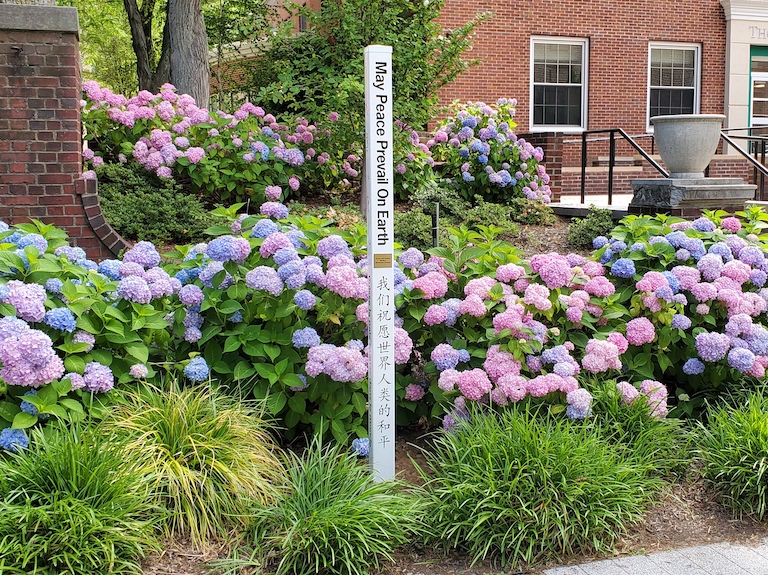Peace Pole Dedication to Cap Peace and Justice Week
The events will take place virtually and at a safe distance during the final week in February.
 From February 21-26, Manhattan College will host a series of events during its annual Peace and Justice Week, surrounding the theme of "Remembering What Really Happened: Peace and Justice for a New Millenium."
From February 21-26, Manhattan College will host a series of events during its annual Peace and Justice Week, surrounding the theme of "Remembering What Really Happened: Peace and Justice for a New Millenium."
“The events we've organized focus on the need to fully acknowledge past injustices before we can move on to figuring out how to remedy them,” said Nuwan Jayawickreme, Ph.D., associate professor of psychology and program director of Peace and Justice Studies.
“These events are consistent with President O'Donnell's call on January 7 to create programming that ‘bring[s] together our College and our many communities, finding our way forward in these perilously divided times.’”
Peace and Justice Week will conclude with a safe, socially distant dedication of the Peace Pole in front of Smith Auditorium, a new monument that was installed on campus during the summer of 2020.
Below is the list of events:
Sunday, Feb. 21, 7:30 p.m.
Sunday Mass at the Chapel of De La Salle and His Brothers. The Mass will include a Peace and Justice-themed reading.
Monday, Feb. 22, 4:30 p.m.
"Making Sense of Historical Monuments" - Lecture by Lisa Blee, Ph.D., department of History, Wake Forest University. Google Meet Link: meet.google.com/aoe-jzgh-szi
Co-sponsored by Peace and Justice Studies, Art History & Digital Media Art, Campus Ministry and Social Action, History, and Urban Studies.
This talk will focus on three historical monuments to make sense of their contradictory nature of permanence and dynamism, discuss their storytelling qualities, and assess their cultural purpose. We will consider whether “monument mania” - the movement that began in the late 19th century - has run its course, or whether monuments can serve a progressive purpose for society as it seeks greater social inclusion and equality.
Tuesday, Feb. 23, 3:30 p.m.
"American Indian Historical Trauma: A Conceptual Overview" - Noberini Psychology Colloquium with Joseph P. Gone, Ph.D., department of Global Health and Social Medicine and department of Anthropology, Harvard University. Google Meet Link: meet.google.com/ipp-nnzs-dnh
Co-sponsored by Peace and Justice Studies, Psychology, Campus Ministry and Social Action, Critical Race and Ethnic Studies, and the Holocaust, Genocide and Interfaith Education Center
Contemporary American Indians suffer from disproportionately high degrees of psychiatric distress. Mental health researchers and professionals, as well as American Indian community members, have consistently associated these disproportionate rates of distress with indigenous historical experiences of European and Euro-American colonization. In contrast to personal experiences of a traumatic nature, the discourse of historical trauma weds the concepts of “historical oppression” and “psychological trauma” to explain community-wide risk for adverse mental health outcomes originating from the depredations of past colonial subjugation through intergenerational transmission of vulnerability and risk. But is this discourse of historical trauma really the best way to describe, explain, and represent American Indian responses to historical oppression and ongoing disadvantage? Dr. Gone will invite the audience to explore this question.
Wednesday, Feb. 24, Noon
"What Does It Mean to Decolonize Psychological Research? Identifying Methods and Practices." A Brown Bag Student/Faculty Discussion with Manhattan College faculty Roksana Badruddoja, Ph.D. and Danielle Young, Ph.D. Google Meet Link: meet.google.com/asd-mugw-dht
Co-sponsored by Peace and Justice Studies, Psychology, Sociology, Campus Ministry and Social Action, and Critical Race and Ethnic Studies
Drs. Badruddoja and Young will lead an informal discussion of the ideas presented in Dr. Joseph P. Gone's presentation the day before, with a focus on exploring whether psychology as a discipline adequately addresses issues faced by colonized groups like American Indians, and if there are curricula changes we should consider to address any identified shortcomings.
Wednesday, Feb. 24, 4 p.m.
"What History Can Teach Us About the Struggle for Racial Justice" - A Slice of Social Justice with Nefertiti Takla, Ph.D. Google Meet Link: https://meet.google.com/pzr-ocue-cjr
Co-sponsored by Peace and Justice Studies, Campus Ministry and Social Action, and History.
This talk will discuss the historical roots of racial injustice using the work of Black scholars and decolonial theorists. It will look at racial oppression on a global scale and provide an overview of key struggles for racial justice around the world over the past century. It will conclude with some thoughts about what lessons we can learn when we think about the struggle for racial justice both globally and historically.
Thursday, Feb. 25, 6 p.m.
"A Student-Led Conversation on Advancing Racial Justice at Manhattan College" Google Meet Link: meet.google.com/ied-jhkw-dqu
Co-sponsored by the Black Student Union, Just Peace, and Peace and Justice Studies
Friday, Feb. 26, 2 p.m.
"Miguel Luciano: Art and Civic Practice" Google Meet Link: meet.google.com/gvw-iiav-mpr
Co-sponsored by Peace and Justice Studies, Art History & Digital Media Art, and Campus Ministry and Social Action
Artist Miguel Luciano will discuss his work as Artist in Residence in The Metropolitan Museum of Art's Civic Practice Partnership Residency program, exploring how artists and communities can challenge institutions to confront their colonial legacies and engage in movements for social change and social justice with deeper commitment and accountability.
Friday, Feb. 26, 3:30 p.m.
Dedication of The Peace Pole
An in-person, socially distanced event in front of the Peace Pole outside Smith Auditorium. Speakers will include President Brennan O'Donnell, College chaplain Father Thomas Franks, OFM, Cap., religious studies faculty Kevin Ahern, Ph.D., and Mehnaz Afridi, Ph.D., and Rachel Roca ’21, president of the Just Peace student group.